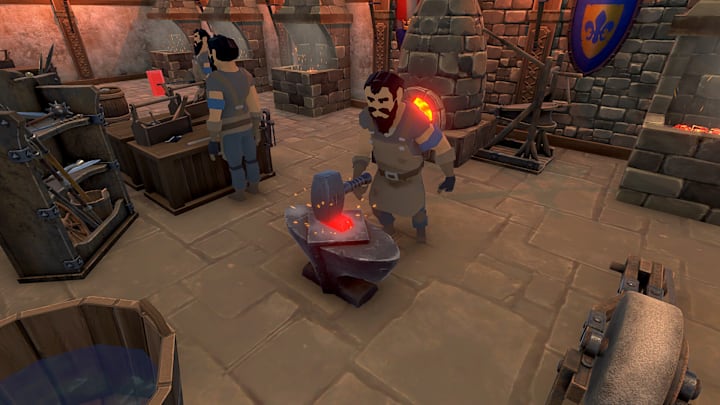Blacksmith Master Early Access review: A robust, well-defined management sim
By Marco Wutz

A blacksmith’s workshop is a bit like an orchestra: There is the ‘ding, ding, ding’ of hammers striking metal, the ‘zschhhhh’ of hot metal meeting water, and the ‘bs-z-bs-z’ of saws cutting wood, and all of these melodies coming together could create chaos or a harmony — which version of the song it’ll be depends on the conductor. In Blacksmith Master, Untitled Studio’s latest management sim, that role falls to you.
Of course, you don’t start out with a mighty orchestra. Your humble shop sports a single anvil when you launch your career. But that’s enough to build up a prospering business. Accepting merchant contracts is the first step towards giving you some much needed capital, so you get your first employee started on a simple delivery and can observe how they go about it.
They take an iron bar from storage, heat it up in a furnace, shape and strike it at the anvil, and then cool it down in a basin before dropping it off at the wagon. This tells you what kind of title this is: It’s about managing the production chain and its logistics. Items don’t teleport. They’re being carried from A to B to C by your workers, which means that optimization is a must to get the best bang for your buck — time is money, after all. Of course, there isn’t much of that to be done until your shop’s grown a bit. Soon you’ll hire some more help, add a workbench for wood products, and place another resting bench to expand your maximum limit of employees.
This is not only important because the volumes of orders go up, but also because more roles become available. For example, placing a chest close to your production area allows smiths to drop off their finished goods there, sparing them the long walk to the merchant carts, thereby increasing productivity. Instead, you can hire assistants to carry items around.
Each employee has different traits and strengths and can level up as they gather experience. Completing a certain amount of merchant orders allows you to hire especially skilled workers to complement your force.
So you keep fulfilling orders and you keep growing. Soon, you’ll need to expand your workshop, using the simple-yet-effective building tools. Again, paying attention to the layout is important, since you’ll want to keep distances short and efficient while averting any traffic jams. You’ll also add another area of revenue: a storefront. You set up shelves, hire a cashier, and decorate the store room to attract additional customers. You even need to put some thought into how you set up your shelves, as customers are more likely to consider items situated near similar goods.
Of course, adding a store to your workshop requires more construction and adds logistical considerations, since you’ll need to split your production between merchant orders and the stocks for your shop.
Naturally, producing and selling standard goblets all the time won’t make you rich. You can upgrade your existing blueprints to higher rarities by using design points and unlock more, complementing what you can offer.
You get another progression resource whenever your workers finish any product, which you invest into new technologies on the tech tree. You’re rewarded with better progression points depending on the rarity of the items you finish, connecting both systems.
It gets a little bit more intricate, of course. Instead of buying raw resources, you can set up your own lumberjack camp and mines to gather them, cutting costs and allowing you access to rarer materials, which in turn requires you to expand the production chain at home, having assistants smelt ores into ingots for your smiths.
If you’re getting tired of conducting the growing orchestra from above, you can take control of one of your workers directly, participating in the production process. Every task has its own little rhythm minigame, offering some variety to the management aspect.
Similar to Tavern Master, the developer’s previous game, that’s essentially the gameplay loop you’ll interact with all game long. It’s robust and it’s satisfying — for a while. Just like Tavern Master, Blacksmith Master is best enjoyed in doses. It’s not one of those games that’ll keep you busy for triple-digit hours. At some point, you’ll have seen everything the game has to offer. You’ll have unlocked all the building pieces, all the blueprints. You’ll simply sit there, listen to your orchestra, and watch your money go up. And while that brings some satisfaction on its own, one can’t help but yearn for a little more spice.
Blacksmith Master isn’t completely rooted in realism, so it feels like a miss not to go all in on the fantasy theme and give us some more exotic resources and products. Let us commission some adventurers to bring us dragon bones or delve into a dungeon for super rare ores. Let us source an artifact for the shop that increases everyone’s walking speed.
Though thoroughly enjoyable, Blacksmith Master’s gameplay loop dulls after a while, making you wish that your well-orchestrated symphony would be interrupted by some sort of crisis — anything to introduce variety and a bit more challenge. If you’re looking for a management sim with well-defined limits that you can put down after a while, satisfied with having accomplished something, this title is an easy recommendation.
Management Sim. PC. Blacksmith Master. Blacksmith Master review score. 7
More reviews on DBLTAP:
feed